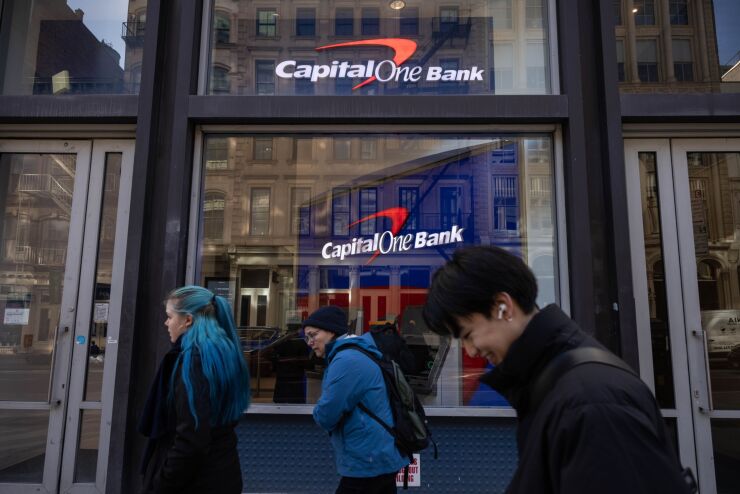
The acquisition, which is scheduled to close in late 2024 or early 2025 pending shareholder and
As a single company, Capital One and Discover could sell to more types of merchants, work with those merchants directly and sell to a broader market geographically.
"Capital One's acquisition of Discover provides an opportunity for Capital One to bring its extensive innovation and technology directly to the merchant without sharing it with Visa and Mastercard, and in turn with Capital One's competitors," said Matthew Goldman, president and founder of Totavi, a payment consulting firm.
'Three party network'
The key to how Capital One can be more competitive resides in how credit card companies engage with merchants. The Discover deal potentially enables Capital One to reduce its reliance on other companies to process payments.
Visa and Mastercard do not have direct relationships with merchants as part of the traditional four-party payment system, which includes the consumer, merchant, bank and payment network. The card networks' member banks do have direct payment relationships with merchants, generally working with merchants through a payment platform or independent sales organization (ISO).
Capital One's acquisition of Discover would enable Capital One to operate similarly to American Express, which runs a "three party network" that includes the merchant, bank/network and the consumer, Goldman said. "Discover and Amex have legally direct relationships with their merchants," said Goldman, noting that Discover and Amex also partly work through ISOs.
A three-party network provides a tighter loop for technology development, pricing and product offerings, according to Goldman.
"Amex is a great example of what can be done here with specialized cards or information offerings," Goldman said. The three-party network can improve access to stock keeping unit information, or SKU-level data.
SKU-level data provides data on sales, such as the time of payment, comparisons to similar purchases at other stores or purchases of a particular product by other consumers. That enables targeted campaigns for marketing, incentives and tailored product suggestions. This is an important part of how merchants aim to grow e-commerce sales and replicate an e-commerce experience inside stores.
The merchant side of payments is a good starting point for deeper financial services relationships with small businesses, said James Wester, director of cryptocurrency and co-head of payments for Javelin Strategy & Research.
"Setting up a merchant account is one of the first things small businesses do after setting up a deposit account," Wester said. "Having a direct relationship with so many merchants at that point would be a good place to begin cross-selling Capital One's portfolio of accounts for small businesses."
There is also the potential for Capital One to reach more merchants in more places.
Capital One's merchant services, supported by the payment technology firm Worldpay, have been largely targeted toward small businesses, while Discover has a full-scale U.S. and international merchant acquiring and servicing business, according to Beth Robertson, managing director at Keynova Group, a consulting firm.
"Merging with Discover, Capital One's merchant services could be fully supported internally, and it could build out the ability to act as a third-party provider similar to WorldPay," she said. "It becomes highly competitive, while also acquiring technology and services that can enable it to support large commercial customers' payment needs."
This pending acquisition shifts Capital One from being a player on the sidelines on the acquiring side to being right in the center of the action, said Michael Seaman, CEO of Swipesum, a merchant services consultant.
"Capital One could work directly with merchants wanting comprehensive payment solutions," Seaman said. "With this strategy Capital One controls the interchange pricing and rewards points, and could be working directly with merchants for more complete payment packages."
Tech-forward
While Discover has had
Discover's
"Discover can do these things and has shown an appetite for innovation," Goldman said.
For its part, Capital One has emerged as a leader
"I'm particularly intrigued about the opportunities for Capital One to layer its digital expertise atop the Discover Network," said Jordan McKee, director of the fintech of the fintech research and advisory practice at S&P Global Market Intelligence.
Capital One's development platform, called DevExchange, could be augmented with application programming interfaces designed to enhance the value of the Discover Network for merchants, McKee said. "This could include a variety of data and insight APIs, such as Capital One's
Capital One has also partnered with
"With a tech-forward merchant services partner now in the mix, it would not be surprising to see creative collaborations and incentives emerge thanks to the addition of the Discover Network," McKee said, adding that this could occur in areas such as debit routing and authorization improvements.
Discover will additionally provide Capital One with its Discover Global Network (DGN) along with Pulse, its U.S debit network.
"DGN creates an opportunity for Capital One to offer a payments acceptance capability around the globe that they don't currently have," said Thad Peterson, a strategic advisor with Datos Insights, adding that Pulse creates opportunities for an alternative processing channel for merchants who need to comply with potential regulations covering alternative debit payment channels.
"Beyond dramatically increasing their issuing customer base and transaction volume, Discover helps position Capital One to adapt to the dramatic shifts underway in the payments acceptance ecosystem," Peterson said.
Penny Crosman contributed to this story.






